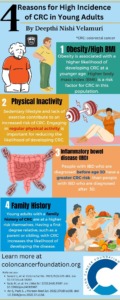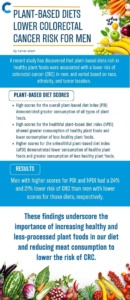Image Credit: CDC on Unsplash
The Colon Cancer Foundation (CCF) spoke with Alessandro Mannucci, MD, who received the 2022 Colon Cancer Foundation and CGA Colorectal Cancer Research Scholar Award to present his work at the 2022 CGA-IGC Annual Meeting in Nashville, TN, November 11-13. Dr. Mannucci, a medical resident in gastroenterology and gastrointestinal endoscopy at the San Raffael Hospital, Milan, Italy, will be presenting his work titled ‘Lynch Syndrome is Associated with Fecal and Salivary Dysbiosis’.
CCF: What is the importance of the gut and the microbial flora in the human body, and how do they influence our well-being?
Dr. Mannucci: Broadly speaking, the microbiota is made up of many different cell types, including bacteria, viruses, fungi, and other kinds of microorganisms. However, our study specifically focused on bacteria because it is known that we have way more bacteria in our body than human cells. That alone indicates the significant impact of the microbiome on different phases of our life—from childhood to adulthood.
The disruption of a healthy microbiome equilibrium causes the components of the microbiome to converge toward a proinflammatory environment in several ways. Certain species increase the risk of colorectal cancer [CRC]. Organisms that increase in numbers in the presence of CRC are generally proinflammatory. This understanding has come simultaneously with the realization that inflammation is one of the new pillars of cancer. The inflammatory environment is a disruption that is particularly important when studying the colon because the colon is the first organ in direct contact with the microbiome.
CCF: Can you tell us the importance of this fact in your research?
Dr. Mannucci: In our study, we had a suspect: the microbiome. While the microbiome is known to play a role in turning a normal cell cancerous, this association had not been investigated in the context of the hereditary Lynch syndrome [LS]. Mutations in one of five genes can lead to LS.
There is a spectrum of manifestations of LS, the most important of which is CRC, although developing the cancer is determined by penetrance. We were interested in knowing if the microbiome has a role in this process.We wanted to know if the microbiome in individuals with LS who had not yet developed cancer, differed from those without LS. While it may be difficult to explain a cause-and-effect relationship, it is important to understand why a difference exists. Germline pathogenic variants may influence the formation, conformation, and diversity of the microbiome, or vice versa. Interestingly, we found that the fecal microbiota was significantly different among those with LS, but we need more data.
CCF: What is the relevance of microorganisms in the oral cavity?
Dr. Mannucci: In individuals with LS, the cells within their mouth are also mutated. So we decided to test the differ

Alessandro Mannucci, MD
ence between the fecal and oral microbiota among those with and without LS and found that not only is the fecal microbiota different, which you would expect because LS is associated with an increased risk of CRC, but we also observed a proinflammatory change in the oral microbiota. We now know that the oral microbiota of patients with LS differs from that of healthy individuals, which raises the question that pathogenic variants inside the mouth may interact with microbiota species that cause a proinflammatory shift.
Another hypothesis is that individuals with this particular hereditary predisposition to CRC may also have a predisposition to orthodontic diseases. While we currently have limited understanding of this association and are testing the hypothesis, our discovery of the unexpected difference of a proinflammatory environment led us to suppose that maybe something else was at play.
What is interesting when we talk about scientific studies is not only what you are interested in, but also what you compare it to. In our case, we compared LS patients without cancer diagnosis to unrelated, healthy patients. So we did not have within-family control, which other investigators might want to look at–within the family or individuals with LS in different age groups.
CCF: How long will the subjects in your study be followed?
Dr. Mannucci: While we usually follow patients throughout their lives, five to ten years of follow-up will give us more insight. The idea is that if there is a proinflammatory environment within that patient, it could trigger cancer at an earlier age. To test that hypothesis, we are collecting samples of relatively young individuals, and we want to follow them and see if they develop cancer. The mean age of patients with LS was 48 years plus or minus 16 years.
CCF: Does diet influence microbial flora and the balance of pro- versus anti-inflammatory microbial flora in the oral cavity and the gut?
Dr. Mannucci: You raise a very, very interesting point! The microbiota is adaptable, and it can change very rapidly. There is some robustness to it, meaning you shape the health of your microbiome during your youth and by the time you reach adolescence or young adulthood, your microbiota is pretty much set. However, it can change based on your diet.
One of our study limitations is that we could not control for diet. We could control other factors that can influence the changes within the microbiota itself, such as age, sex, smoking, the presence of cancer, or chemotherapy treatment—factors that can modify the shape, overall biodiversity, and the general composition of the microbiota.
However, we could not control the overall dietary composition. In the future, we may control our patients’ diet and place them either on a Western diet as opposed to a Mediterranean diet or a modern diet.
Assuming that individuals with a higher risk of CRC follow an anti-inflammatory diet, you would expect to see an anti-inflammatory microbiota. We found the opposite; we found a proinflammatory change within the microbiota. While we are planning to control for participant diets in future studies, an alternative approach would be to include individuals with different genetic backgrounds and eating similar diets to investigate the differences in their microbiota.
But remember, this is currently a hypothesis. What we know now is that these genetic predispositions are associated with a difference in the microbiota composition, and that difference itself is a proinflammatory environment. We don’t know the cause-effect relationship or how that can be altered, yet.
CCF: What would be a key takeaway from your study findings?
Dr. Mannucci: A key takeaway is that we’re developing a tool to better understand who does or does not get cancer. Hopefully, it will become a tool or a target to reduce the risk of cancer. I completely agree that diet can be a big influence. So maybe in the near future, we will be able to tell our patients that if they stop smoking, regularly exercise, reduce the intake of fatty foods, and if they have a specific kind of diet, they can reduce their risk of CRC. The microbiota has the potential to become an instrument for reducing the risk of cancer, but we are not there yet.
Thank you to Sahar Alam, CCF’s Colorectal Cancer Prevention Intern, for her assistance with this post.




 The multiethnic cohort study included 79,952 men and 93,475 women. Three plant-based diet scores were investigated to determine the incidence of invasive CRC:
The multiethnic cohort study included 79,952 men and 93,475 women. Three plant-based diet scores were investigated to determine the incidence of invasive CRC:


